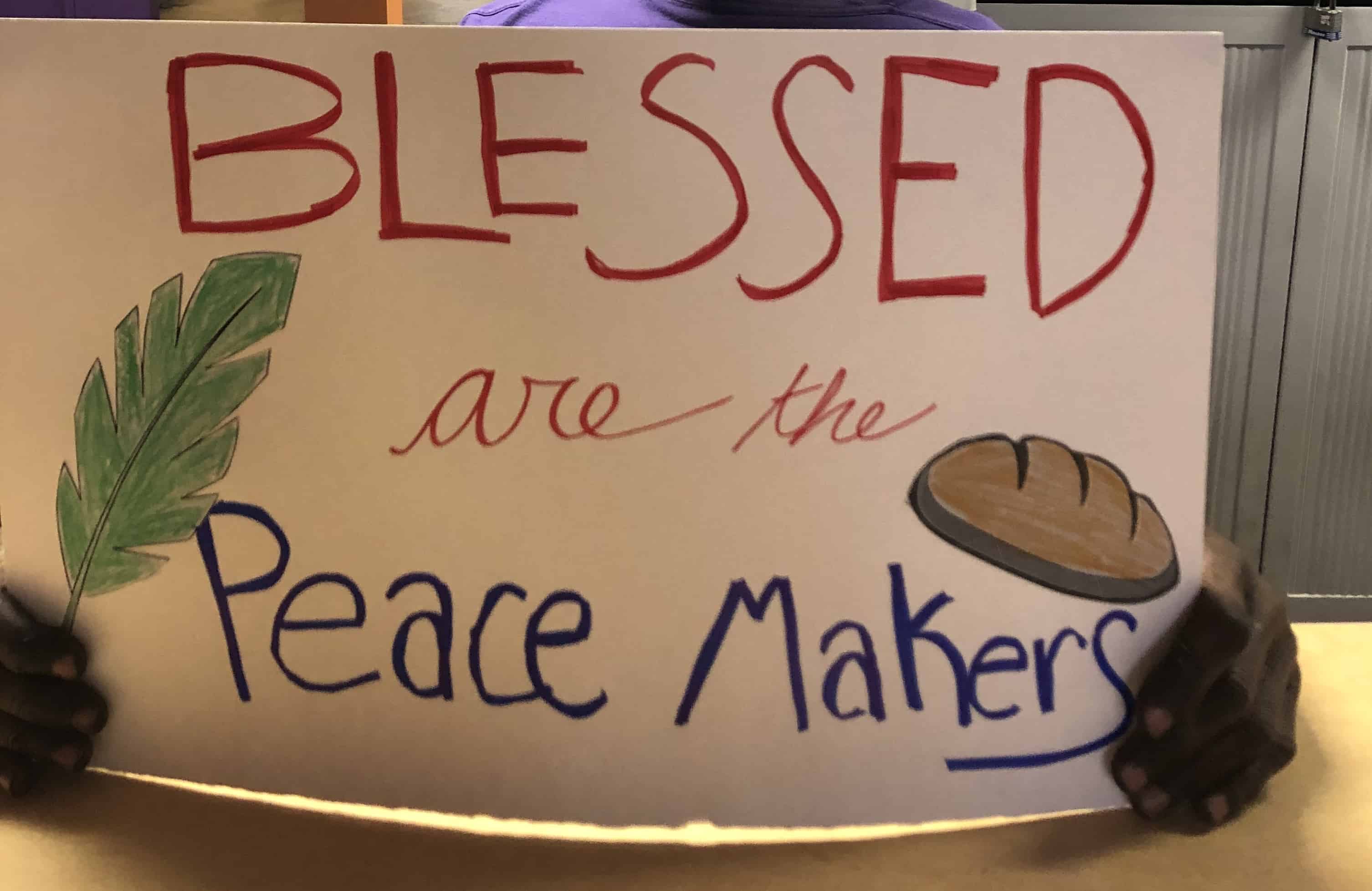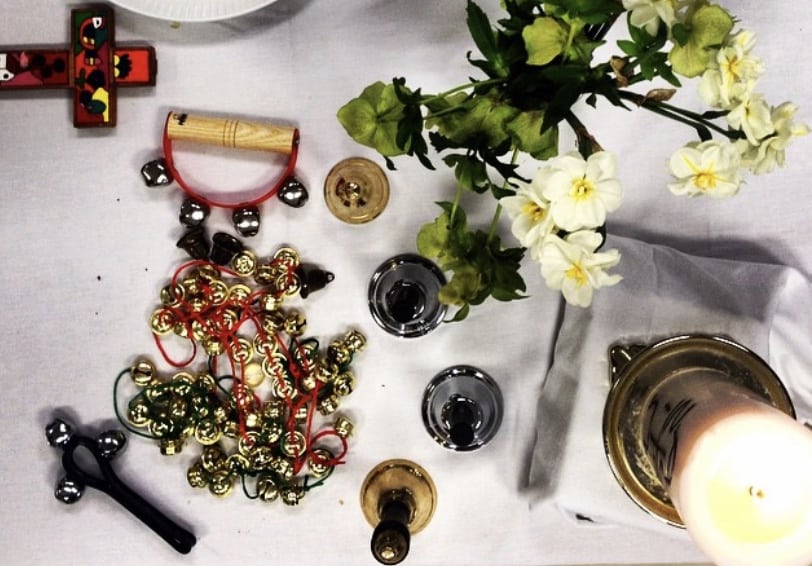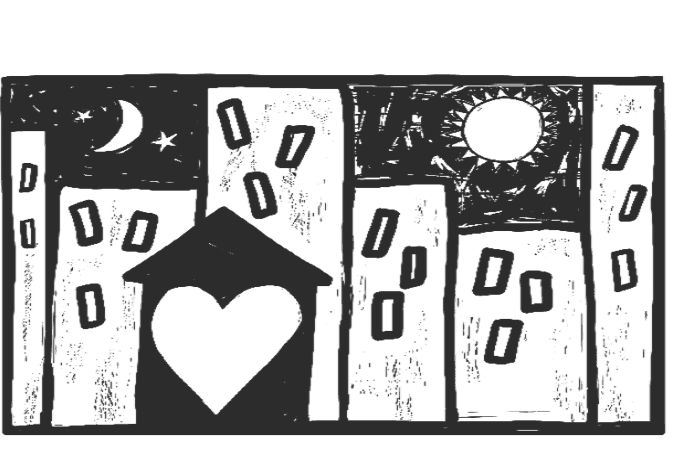By: Chad Hyatt
Isaiah 2:1-5
Reflection—v. 4 ‘they shall beat their swords into plowshares’
We sing a song at Mercy about going down by the riverside, laying down burdens and swords and shields, and all the while walking with the Prince of Peace. I imagine the nations flocking toward the house of God in Isaiah’s vision singing along with us: ‘We ain’t gonna study war no more.’ That sounds like a dream King would dream. But the vision is more than singing, more than shouting and praying and even prophesying. The dream dawns a new day when the salty sweat on our brows and the hard metal of our anvils turn weapons of war into tools of peace. Advent calls us once again to conversion, and Isaiah gives us a practical vision of healthy penance. We live amid a culture that so idolizes violence as to propose that the best way to stop violence is to arm ourselves with even more weapons. We live amid weaponized violence in our schools and streets and homes. We suffer the dehumanizing violence of racism and genderism, the other-ing and scapegoating of entire groups of people. We are inundated by the violence of our angry words and gross intolerance toward those who disagree with us. We endure the violence embedded in systems that crush the poor. And we must confront the violence of our own hearts as we lift ourselves up by putting others down. It’s time to take the hammer to our violent ways, refashioning how we hold one another in relationship so that the sacredness of all life is honored.
Prayer: God of plowshares, help us to transform patterns of violence into ways of life.
Tuesday, December 3rd
By: Chad Hyatt
Psalm 122
Reflection—v. 8 ‘For… my relatives and friends, I will say, “Peace be within you.”’
Wouldn’t it be great to feel good about our institutions again? Our psalm is a pilgrim psalm—the prayerful song of someone going up to the Temple for worship. You can sense the joy of the pilgrim coming into the city and the glow of the Temple, throngs crowding the streets, abuzz with anticipation for celebrations to come. The other day I drove down the street coming into town, passing the hollowed-out shell of a church where many of us on the street used to sleep. An advertisement boasted that this old sanctuary would soon be condos selling for a million dollars each. We could look to the halls of Congress or the steps of St. Peter’s, wander over to city hall or just sit in our own pews, but the sense of disappointment and disillusionment would be the same. Yet our institutions are us. Yes, they are more-than-us in ways that we don’t always account for. But it’s a poor sinner indeed who points a finger at someone else and doesn’t take responsibility for their part in what has gone wrong—and therefore the power each of us has to make things right again. We are called to pray for the peace of our institutions, and biblical peace is wholeness and well-being. It isn’t just the absence of tension, as Martin Luther King reminds us, but the presence of justice. It isn’t quietness and calm but righteousness and the balm that heals our brokenness, beginning with the most vulnerable who still suffer at our doorsteps.
Prayer: God of cities, we pray for wholeness and well-being in our lives together
Sunday, December 1st
By: Chad Hyatt
Matthew 24:36-44
Reflection – v. 37 ‘as the days of Noah were, so will be the coming of the Son of Man’
Apocalypse does not portend the end of the world. It literally means ‘revelation.’ This is not just a technical point: apocalyptic language reveals, uncovering the truth about our reality and the times in which we live—however strange and obscure the language may seem. That brings us to a second point. Apocalypse is about our times—not the end-times. To put the apocalypse off into the future robs its dramatic power and shields us from its call to action. Worse, it leaves us numb to the truth of God’s liberating activity in our present. Apocalyptic language helps us diagnose the truth of our times, determining where God is in the seeming chaos of our world. While images of many-headed beasts and earth-shaking signs may seem strange, even frightening, that language may help us to name the beastly power of systems and institutions and currents of racism that threaten human community, sending shockwaves around the globe. This language grabs our attention with ultimate urgency so that we might see that our own times are as critical as the ‘days of Noah’ or the end of the world—for these are our days and this is our world. Right now and right here is where the drama of our salvation unfolds. Apocalyptic literature gives us language to name the truth that we must work for justice when it seems the world is on fire. We are called to live out our faith besieged by forces that are bigger than us—but not bigger than our God.
Prayer: Help us, God of truth, to see our world as it is.



